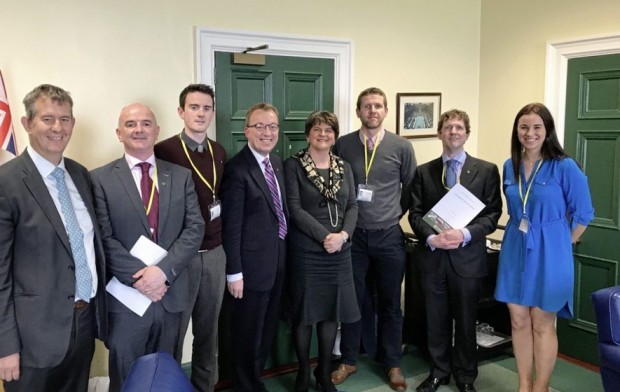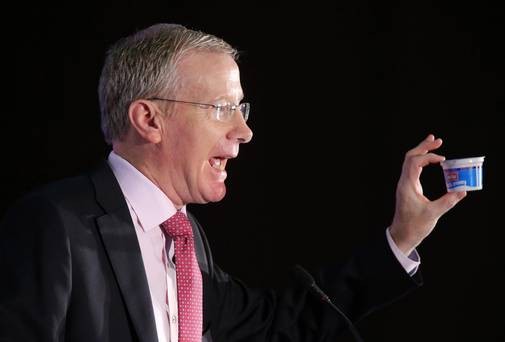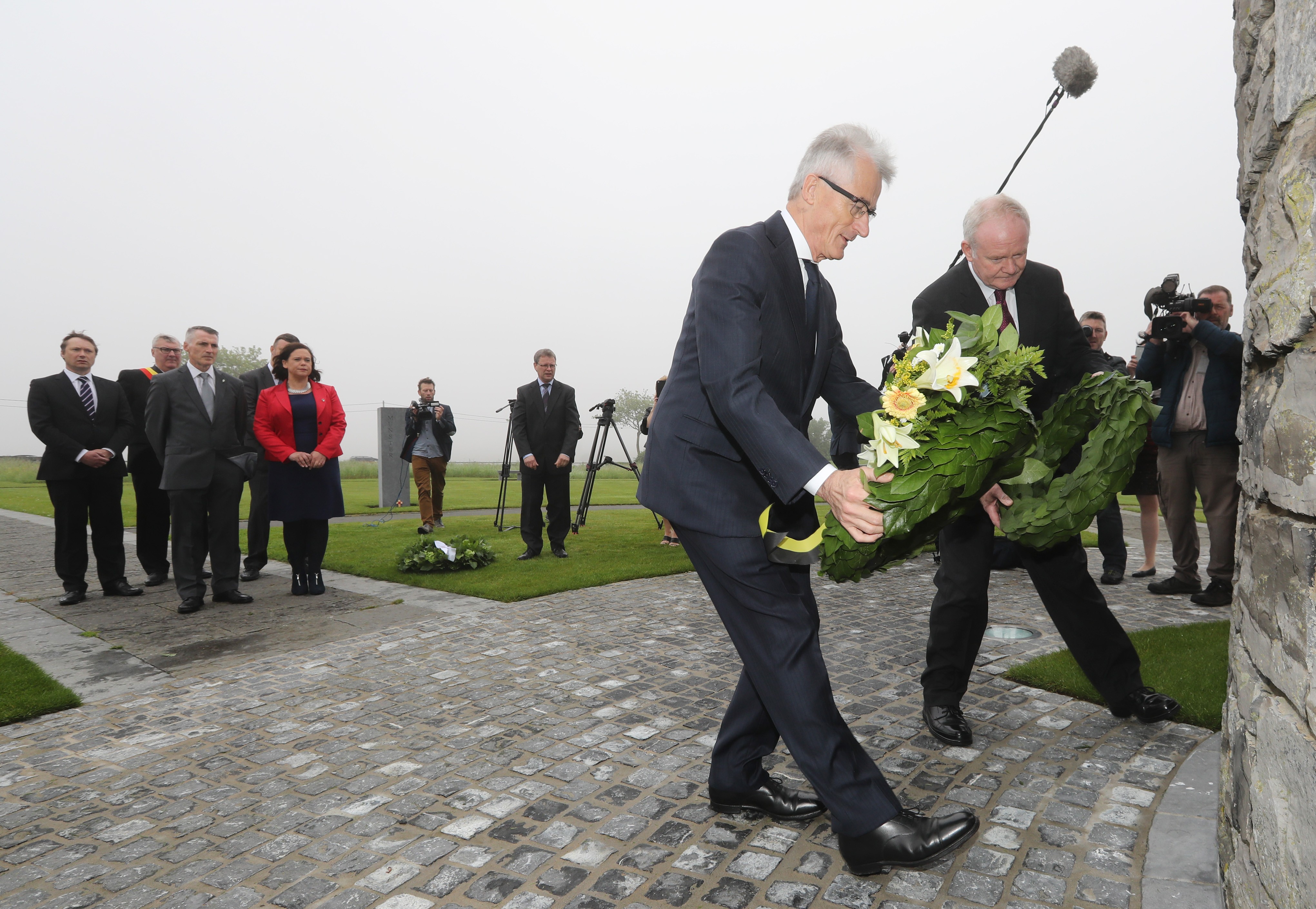11 May 2017
DUP illusions running out of road

DUP representatives meeting Irish language activists at Stormont
"As a party the DUP does not believe in equality, rights or reconciliation, and cannot move on from the past" - Declan Kearney
IN recent weeks a fiction has begun to gain some currency that the DUP is softening its position. This has no basis in fact.
The consistent reference point is the DUP leader’s decision to visit Irish language students at a Newry school and a cross-section of Irish language organisations.
Of course these are welcome developments. But it was the DUP leader and other senior figures who politicised the Irish language. So when set alongside the context which forced the DUP leader to seek these meetings, and that party’s opposition to appointing an Irish language officer in Belfast city council, as well as another senior figure’s most recent assertion on 10 May that “there will be no Irish Language Act”, then it all seems very hollow and synthetic; similar to a previous DUP leader’s decision to attend a McKenna Cup final!
The DUP are conniving to portray themselves reasonable, ready and willing to go back into government. But the party has a forked tongue approach to what’s needed to re-establish public confidence and the political institutions.
The DUP absolutely does want back into government; but without having to address any of the core issues which caused the collapse of the political institutions, the loss of public confidence in the political process, and the present huge political crisis.
Regardless to the DUP leader’s optical illusion on the Irish language and increasing absence from significant media engagements, the party has not changed its position on equality, rights or legacy.
A shroud of financial scandal continues to hang over the political process. RHI has not been resolved. Questions remain unanswered in relation to the NAMA loan book scheme. Politics has been corrupted by the clear perception of institutionalised bigotry in relation to financial governance and public policy decisions – Líofa and the Community Halls scheme are just some of the most immediate examples.
And the common denominator in relation to all of the above is the DUP.
Senior DUP figures have chosen to weaponise the past, and increasingly so since the Westminster general election was announced. Legacy has been cynically promoted as an electoral battleground by those who in other places speak rhetorically about conflict resolution.
Once more the DUP forked tongue approach applies.
Having previously opposed ‘amnesty’ during the Stormont House talks, the same individuals want an amnesty as well as legalised impunity from prosecution for the actions of British state forces during the conflict. While at the same time they demand the prosecution of republicans and nationalists.
Sinn Féin’s massive investment in the development of reconciliation and healing, including the work of Martin McGuinness and others – which embraced outreach to the British Royal family, visits to Flanders fields and the Somme, and explicit acknowledgement and sorrow for the pain and hurt inflicted by republicans during the war – has never been reciprocated by the DUP or political unionism.
The DUP speaks with a forked tongue on this issue also.
It claims to support the need for reconciliation while taking every opportunity to ridicule and reject efforts to develop a positive public discourse on how we can move towards a new phase of the peace process.
Contrast the DUP mind-set with Prince Charles’ decision to speak Irish twice in Dublin last night and to try his hand at hurling today.
The party uses the rhetoric of a shared future but it does nothing to provide leadership or vision on how that should be brought about. It refuses to accept the logic of agreeing to disagree on the multiple narratives about our shared history and past. Instead it demands primacy for a single unionist narrative, and then accuses republicans of attempting to rewrite history!
Sinn Féin has no interest in rewriting history but neither will republicans allow ourselves to be written out of history by political unionism or the British state.
The DUP’s opposition to the equality agenda and the need to put objective need at the centre of public policy sits in complete contradiction to its stated wish to make the political institutions work in the social and economic interests of all citizens, and against poverty and disadvantage. It is a perverse irony that a unionist paramilitary is more likely to get a meeting with a DUP minister than a local trade unionist.
When talks resume after the Westminster general election they will have to address all of the same issues. Because none of the issues, which forced Martin McGuinness to resign have been resolved.
Opposition to a rights-based approach to government is not acceptable.
An Irish Language Act, Bill of Rights, Marriage Equality, a Civic Forum, and resolution of legacy are central issues.
Delivering on these fundamentals is all-important, and not in a piecemeal or minimalist way.
Equality, rights and respect are absolutely vital to rebuilding confidence.
The DUP has not delivered.
Using a forked tongue approach to create the illusion of movement whilst not changing its position on any of these issues is a strategy, because the DUP cannot and will not deliver.

It is saddled with theological, philosophical and political dogma and policies, which are totally incompatible with a modern 21st century society, and are in fact out of step with the aspirations and mind of wider popular civic unionism.
The DUP forked tongue approach to this crisis and political progress means only one thing after the 8th June election, and that is the political process will arrive at a fork in the road. That will be the choice we as a society must make between permanent political instability and crisis in the north of Ireland, because the DUP is opposed to equality and rights; or sustainable political institutions which are based upon equality, rights, respect and the Good Friday Agreement.
Our people sent a clear message on the 2nd March: the electorate chose the latter.
The DUP still hasn’t got that message. It’s long past time that it did so.
This much is clear, the DUP and political unionism isn’t in the driving seat any more, and it’s not going to be putting any section of our society to the back of the bus again.
That reality needs to be reaffirmed on the eighth of June.

Follow us on Facebook
An Phoblacht on Twitter
Uncomfortable Conversations

An initiative for dialogue
for reconciliation
— — — — — — —
Contributions from key figures in the churches, academia and wider civic society as well as senior republican figures





